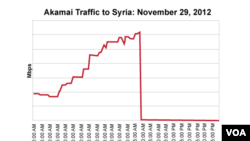The Syrian government imposed a wholescale Internet blackout Thursday along with severing phone service, leaving Syrians largely cut off from contact with the outside world.
The Internet outage was confirmed by two U.S.-based companies that monitor online connectivity and is unprecedented in the 20-month-long uprising against Syria's President Bashar al-Assad.
Authorities often cut phone lines and Internet access in areas where government forces are conducting major military operations.
Internet experts tracked the outage to government-controlled tracer routes. But a pro-government television station quoted Syria's minister of information as saying "terrorists" - the government's term for the opposition - were responsible.
World notices
Social media websites started buzzing Thursday morning as most of Syria appeared to be offline.
Jim Cowie, the chief technology officer and co-founder at U.S.-based Renesys, a firm that monitors Internet connectivity, said the blackout is extensive.
"It's a somewhat unambiguous situation," Cowie said. "The Internet has simply turned off."
Cowie told VOA that the data show a clear and sudden drop-off.
"Almost everything that is owned by Syria - almost all of the IP addresses that they have registered to them - you can't get to," he said. "This morning they went off the air. They were literally removed from the global table and can't be reached."
Other Internet monitoring sites, including U.S.-based Akamai, confirm the findings.
U.S. outrage
In Washington, State Department spokesman Victoria Nuland condemned what she called a desperate move by a desperate regime.
"The regime does appear to be resorting to cutting off all kinds of communications - cellular networks, land lines as well as Internet service across the country, notably in Damascus and the suburbs as well as in Hama, Homs and Tartus," she said.
Nuland said that despite the blackout, opposition groups should be able to communicate with the outside world thanks to U.S.-provided communication kits that allow contact through outside proxys.
U.S. Ambassador to Syria Robert Ford said in a Washington appearance that the Internet blackout is not entirely surprising. He said Syria's government has long been using Iranian expertise to monitor the web to "track opposition activists, to arrest and kill them."
Ford said he fears the shutdown is an attempt by the Syrian government to further its brutal crackdown of dissent and keep the world from finding out.
"In 1982, Bashar al-Assad's father Hafez shut down all communications and the world never got a clear picture of what happened in [a massacre in] Hama," Ford said. "We do not want a repeat of that. A lot of the pictures that you see on the nightly news are from communications equipment that we supply to very brave and to very dedicated opposition activists inside Syria."
Internet expert Cowie said such a widespread shutdown is very unusual, although not too hard to engineer given Syria's infrastructure.
"Syria has very few Internet service providers," he said. "Almost all of Syria's telecommunications are handled by the Syrian telecommunications establishment. There's probably a handful of buildings in the entire country, maybe as few as one or two, where telecommunications really passes through in a critical way.
"And so by shutting off power or by turning off service at those points, it's actually fairly easy to turn a country like Syria off," Cowie said.
The last time the world has seen something close to this was last year, Cowie said, when the Egyptian government shut down the Internet in an attempt to dampen enthusiasm for Egypt's uprising.
The Internet outage was confirmed by two U.S.-based companies that monitor online connectivity and is unprecedented in the 20-month-long uprising against Syria's President Bashar al-Assad.
Authorities often cut phone lines and Internet access in areas where government forces are conducting major military operations.
Internet experts tracked the outage to government-controlled tracer routes. But a pro-government television station quoted Syria's minister of information as saying "terrorists" - the government's term for the opposition - were responsible.
World notices
Social media websites started buzzing Thursday morning as most of Syria appeared to be offline.
Jim Cowie, the chief technology officer and co-founder at U.S.-based Renesys, a firm that monitors Internet connectivity, said the blackout is extensive.
"It's a somewhat unambiguous situation," Cowie said. "The Internet has simply turned off."
Cowie told VOA that the data show a clear and sudden drop-off.
"Almost everything that is owned by Syria - almost all of the IP addresses that they have registered to them - you can't get to," he said. "This morning they went off the air. They were literally removed from the global table and can't be reached."
Other Internet monitoring sites, including U.S.-based Akamai, confirm the findings.
U.S. outrage
In Washington, State Department spokesman Victoria Nuland condemned what she called a desperate move by a desperate regime.
"The regime does appear to be resorting to cutting off all kinds of communications - cellular networks, land lines as well as Internet service across the country, notably in Damascus and the suburbs as well as in Hama, Homs and Tartus," she said.
Nuland said that despite the blackout, opposition groups should be able to communicate with the outside world thanks to U.S.-provided communication kits that allow contact through outside proxys.
U.S. Ambassador to Syria Robert Ford said in a Washington appearance that the Internet blackout is not entirely surprising. He said Syria's government has long been using Iranian expertise to monitor the web to "track opposition activists, to arrest and kill them."
Ford said he fears the shutdown is an attempt by the Syrian government to further its brutal crackdown of dissent and keep the world from finding out.
"In 1982, Bashar al-Assad's father Hafez shut down all communications and the world never got a clear picture of what happened in [a massacre in] Hama," Ford said. "We do not want a repeat of that. A lot of the pictures that you see on the nightly news are from communications equipment that we supply to very brave and to very dedicated opposition activists inside Syria."
Internet expert Cowie said such a widespread shutdown is very unusual, although not too hard to engineer given Syria's infrastructure.
"Syria has very few Internet service providers," he said. "Almost all of Syria's telecommunications are handled by the Syrian telecommunications establishment. There's probably a handful of buildings in the entire country, maybe as few as one or two, where telecommunications really passes through in a critical way.
"And so by shutting off power or by turning off service at those points, it's actually fairly easy to turn a country like Syria off," Cowie said.
The last time the world has seen something close to this was last year, Cowie said, when the Egyptian government shut down the Internet in an attempt to dampen enthusiasm for Egypt's uprising.





